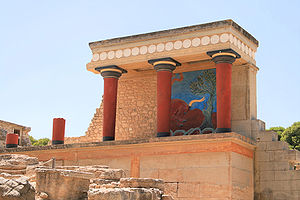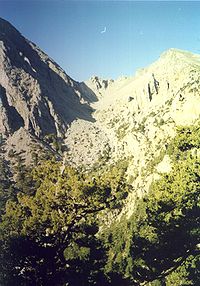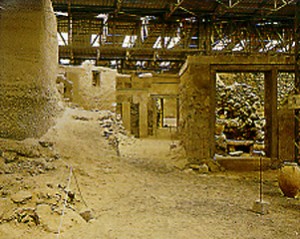Many years ago I decided to go to Athens and Crete. Why? Because in my textbook for art history (Janson) there was what was clearly a toilet and a bathtub at the ruins at Knossos on Crete. In fact, that 3,000 year old town even had a sewage system!
Odd, I reflected, that people in 19th century London threw their “slops” out the windows, and that even my parents grew up with an outhouse. Greece must be terribly civilized I thought.
To prepare for my trip, I decided to learn Greek. I found a class over in San Francisco and enrolled. My teacher was a married woman who came from Crete. Many of my classmates had been to Greece as well. Two in particular I noticed.
She was a waitress at a restaurant, the kind of attractive woman that you know who has “been around”. He was a bartender looking slightly dissipated at age thirty who worked in the same place she did. They joked constantly about Greece, but with an ironic affection. Both intended to go back for a visit. So did my teacher, and it turned out we were going at the same time. So we arranged to meet on Crete
“Modern” Greece
Arriving in Athens, I found that Europe and America were not the only places that slid backwards in terms of bathroom technology. Unlike Spain, where the airport had beautiful marble sinks and gold-plated faucets in the airport women’s room, but no water, Greece didn’t even pretend to be modern.
Toilets in the hotels were flushed by pulling a chain that released water downward from a ceramic box above the toilet. Showers were simply a shower head and handles extending from the wall with a nearby drain in the floor. Public restrooms consisted of a concrete platform containing a toilet-sized hole. Luckily my classmates had warned me to wear a skirt and washable shoes!
The nice thing about the public restrooms was they had something you’d see here only in an exclusive restaurant — a woman handing out towels, whom one tipped. I realized how true what my classmates had said. Greece was a place that catered to tourists, most of whom came from Europe on their one-month summer vacations.
Crete
A worker’s strike had shut down the Acropolis, so, after a few days in Athens, I traveled early to Crete.
On arrival in Heraklion by a Greek ship, I began walking around a charming, somewhat sleepy, Mediterranean city. Passing a whitewashed tavern in the morning, I heard a familiar refrain. It was an old hit by Leonard Cohen – “First we take Manhattan, then we take Berlin,” Inside, the whole crowd lustily sang along.
I wasn’t really surprised. In Athens I’d seen the navy blue buses cruising around, full of young men picked up at political rallies for some offense or other. There were multiple political parties in Greece, very antagonistic to each other, and even an NGO for women that aimed, regardless of party, to get 50% of office-holders to be female.Greece is indeed, the cradle of democracy, especially after surviving the cruel dictatorship of its military junta in the 1960s.
Crete, invaded by the Germans, was deeply affected by World War II as well. On Crete I took my clothes to a laundry run by a stolid, stocky, scowling German woman with a nasty-looking dog. On my return to pick up the laundry I asked her how living on Crete was. She loudly complained that Cretans were unfriendly and she hated it. How long had she been there, I asked? “Twenty years,” was the snarled reply.
I’d arranged to meet my Greek teacher in her hometown to visit an off-the-beaten-track ruin near Sitia and meet her family. At the family’s home, the women told me about keeping chickens under the houses and silkworms on their breasts during the War. Puzzled I asked why. The chickens were hidden because the German soldiers took their food. The worms warmed because electricity was scarce. Silk, I learned, was once the great pride of Crete.
After a dinner of the most amazing chicken (“Tasted like beef,” I observed), and a discussion of politics among the family, the father announced that “The show is almost over.” We arose and went into the living room, arranging ourselves around the small black and white TV. A comedy ended and commercials began to play. The commercials, much like the live ones I saw when a child, went on for half an hour!
“The commercials are the best part, said the old man. Everyone else nodded.
Back in Athens, the cradle of civilization
My two jaded classmates in San Francisco had joked that they’d like to take a limousine and drive it around Athens so they could watch the amazement on the faces of the Greeks. Athens was indeed a totally middle class city with a large number of unemployed young men. There were no ostentatious rich people. Nor were there any panhandlers. Greek families take care of their own. And more importantly, the streets of Athens were far too small for a limo to pass through them!
Back in Athens I breathed in the mix of ancient and modern air and headed up to the Acropolis before packing to go home. Coming down the hill again, I walked into the park below the fabled hill. There, columns from an ancient temple lay in pieces in front of a partial wall of the temple left standing. In a postmodern collage, the columns and temple wall were utterly dwarfed by the modern glass and steel skyscrapers surrounding the park.
I thought of the things I’d noticed on my trip: the kindness of the Greek people, the wads of colorful Greek money that was too large for the men to fit into wallets, the statues at the museum in Delphi that seemed alive, the wild goats with vertical cat eyes munching grass at the foot of the Samaria Gorge trail near Chania the freedom-fighters used to fight the Germans, the ancient town of Akrotiri on Santorini with its two story stucco houses that looked just like those in the Bay Area of San Francisco, and the food, wonderful food served by bored, male waiters, who never brought the check.
http://goeurope.about.com/od/greece/ss/crete-map-travel-guide_5.htm (gorge)
http://travelingclassroom.org/?p=210 Akrotiri
And then I spotted it! There at the edge of the park in Athens was an ancient Cretan-style bathtub, complete with drain hole, lying among the other ruins.
It was big. When I reached it, It was nearly as high as my waist. I peered down into it, recalling again my amazement with what the ancients in that country had devised. Instantly I was struck dumb by another contrast with modernity in that park. For there at the bottom of the ancient bathtub lay a used condom.
So why the danger of default?
Greece, joked my two jaded classmates, was a country whose economy was based entirely on tourism, kind of like the area of San Francisco (North Beach) they lived and worked in. “If tourism ever goes, so will Greece,” they proclaimed.
Well, tourism has gone. We’ve seen it here in the Bay Area as the busloads of Japanese tourists vanished, and I can imagine it there. Taking a long view of the financial crisis, as if one could see it all from a spaceship, it seems like all those people who didn’t “got the faith to stand their ground” were shaken loose by this crisis in a way like almost never before.
Fraudsters, successful at front-running, ponzi schemes, and other scams were outed by the drying-up of money they could no longer get their hands on. Those who bought and those who didn’t sell houses at the beginning of the slump slid underwater. Storefronts became vacant everywhere, even in the upscale malls. Those whose jobs were based on consumer demand were handed pink slips. Even the illegal immigrants from Mexico left the West Coast in droves.
All of us will have to remake ourselves to survive in this century. Greece will survive. I have no doubt of that. But when I think of poor Greece paying the price again, I cry. The only consolation I can see is that perhaps, if dropped from the European Union, the Greeks will bring back their lovely money again.


